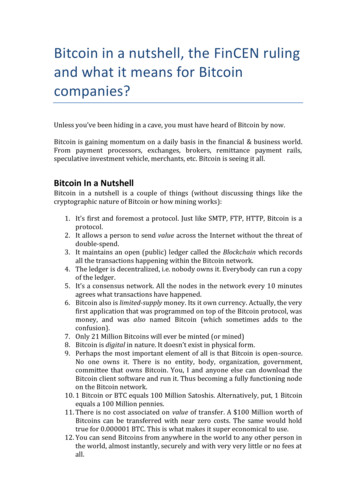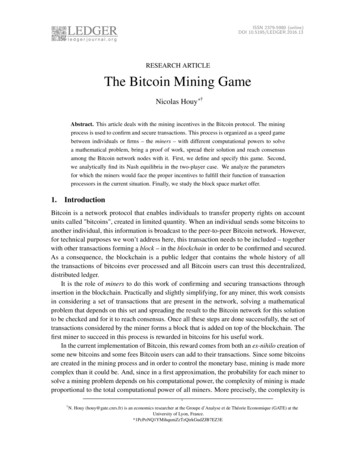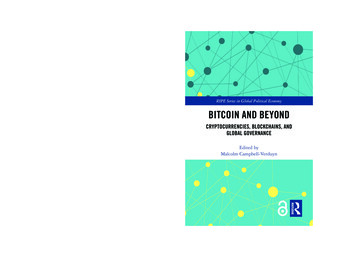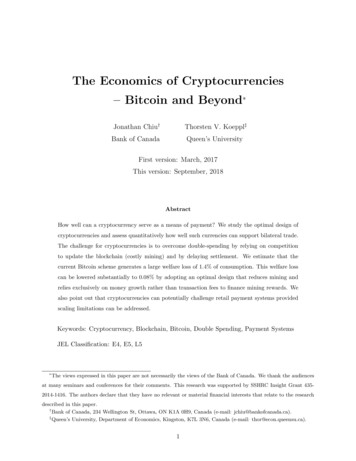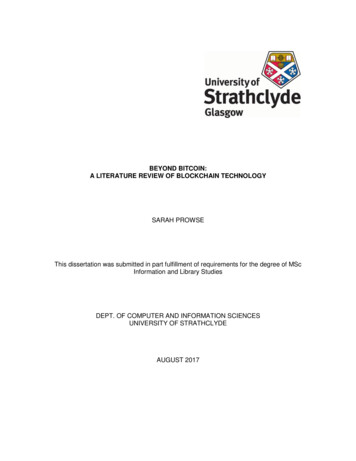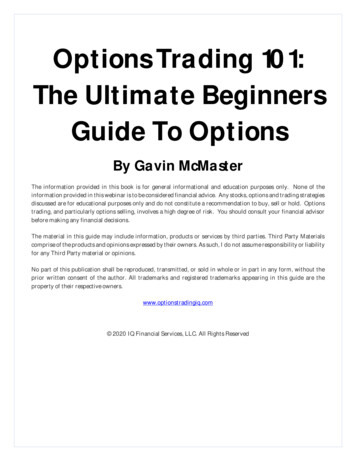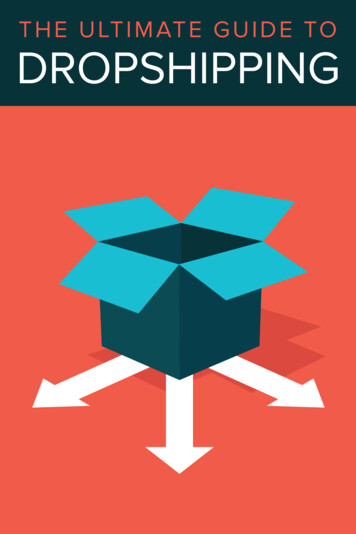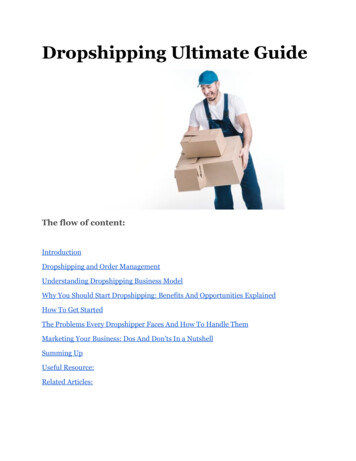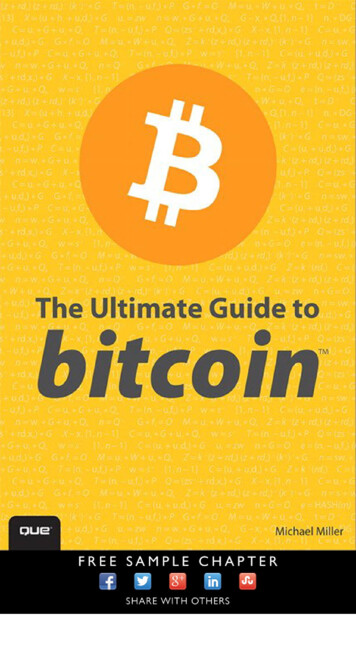
Transcription
The Ultimate Guide toBitcoin MICHAEL MILLER800 East 96th Street,Indianapolis, Indiana 46240 USA
The Ultimate Guide to Bitcoin Copyright 2015 by Pearson EducationAll rights reserved. No part of this book shall be reproduced, stored ina retrieval system, or transmitted by any means, electronic, mechanical, photocopying, recording, or otherwise, without written permission from the publisher. No patent liability is assumed with respect tothe use of the information contained herein. Although every precaution has been taken in the preparation of this book, the publisher andauthor assume no responsibility for errors or omissions. Nor is anyliability assumed for damages resulting from the use of the information contained herein.ISBN-13: 978-0-7897-5324-3ISBN-10: 0-7897-5324-3Library of Congress Control Number: 2014942081Printed in the United States of AmericaFirst Printing: October 2014TrademarksAll terms mentioned in this book that are known to be trademarksor service marks have been appropriately capitalized. Que Publishingcannot attest to the accuracy of this information. Use of a term in thisbook should not be regarded as affecting the validity of any trademark or service mark.Warning and DisclaimerEvery effort has been made to make this book as complete and asaccurate as possible, but no warranty or fitness is implied. The information provided is on an “as is” basis. The author and the publishershall have neither liability nor responsibility to any person or entitywith respect to any loss or damages arising from the information contained in this book.Special SalesFor information about buying this title in bulk quantities, or forspecial sales opportunities (which may include electronic versions;custom cover designs; and content particular to your business, training goals, marketing focus, or branding interests), please contact ourcorporate sales department at corpsales@pearsoned.com or (800)382-3419.For government sales inquiries, please contact governmentsales@pearsoned.com.For questions about sales outside the U.S., please Greg WiegandExecutive EditorRick KughenManaging EditorKristy HartProject EditorsMelissa SchirmerElaine WileyCopy EditorCheri ClarkSenior IndexerCheryl LenserProofreaderKatie MatejkaTechnical EditorTimothy L. WarnerPublishing CoordinatorKristin WattersonCover DesignerMark ShirarSenior CompositorGloria Schurick
CONTENTS AT A GLANCE123456789101112131415ABCDEFGIntroduction . xiBitcoin: The Future of Currency?. 1Understanding Virtual Currency . 9A Short History of Bitcoin . 17How Bitcoin Works . 33Determining Bitcoin Value . 49Should You Use Bitcoin? . 61Trading on Bitcoin Exchanges . 73Storing Bitcoins with a Bitcoin Wallet . 89Spending Bitcoins . 103Accepting Bitcoins for Payment. 115Mining Bitcoins . 123Speculating in Bitcoin . 141The Many Risks of Using Bitcoin. 151Exploring Other Virtual Currencies . 161Peering Into the Future of Bitcoin . 175Glossary . 183Resources . 191How to Read Bitcoin Pricing Charts . 197Donating (and Accepting) Bitcoins for Charity . 203Creating an Unhackable Paper Bitcoin Wallet . 207Why Prices Go Down . 211Bitcoin and Apple Pay . 215Index . 217
TABLE OF CONTENTS1 Bitcoin: The Future of Currency?1Bitcoin in the News . 2What Is Bitcoin? . 3No, Really, What Is Bitcoin? . 5What Famous People Are Saying About Bitcoin . 6Does Bitcoin Really Matter to You? . 72 Understanding Virtual Currency9What Is Currency? . 10What Is Virtual Currency? . 11What Are Digital Currency and Cryptocurrency? . 13Is Bitcoin a Virtual Currency?. 143 A Short History of Bitcoin17Virtual Currency Before Bitcoin . 18Then Came Bitcoin . 23Bitcoin Today. 324 How Bitcoin Works33Understanding Bitcoins. 34Walking Through Some Typical Bitcoin Transactions . 35Managing Bitcoin Transactions . 40Understanding Bitcoin Denominations . 42Verifying Transactions and Creating New Bitcoins . 43Understanding Bitcoin Encryption . 455 Determining Bitcoin Value49Does Bitcoin Have Value?. 50Who (or What) Decides How Much a Bitcoin Is Worth?. 52How Much Is a Bitcoin Worth, Anyway? . 53
ContentsHow Has Bitcoin’s Value Changed Over Time?. 54Where Can You Find the Current Value of Bitcoin? . 576Should You Use Bitcoin?61Who Bitcoin Was Originally Designed For . 62Who Uses Bitcoin Today—and Why. 63Is Bitcoin for You? . 67What Next?. 707Trading on Bitcoin Exchanges73How Bitcoin Exchanges Work . 74How to Choose the Right Exchange . 76Exploring the Big Five Bitcoin Exchanges . 77Discovering Other Popular Exchanges . 82Making a Trade. 858Storing Bitcoins with a Bitcoin Wallet89Understanding Bitcoin Wallets . 90Examining Different Types of Bitcoin Wallets . 91Using a Bitcoin Wallet . 97Securing Your Bitcoin Wallet . 989Spending Bitcoins103Who Accepts Bitcoin Payments? . 104Paying with Bitcoin . 108Converting Bitcoin to Gift Cards . 110Using Bitcoin ATMs. 11110Accepting Bitcoin Payments115Should You Accept Bitcoin Payments? . 116Evaluating Bitcoin Payment Processors . 117Accepting Bitcoin on Etsy. 120v
vi11Th e Ultima t e Gui de t o Bi t c o i nMining Bitcoins123What Is Bitcoin Mining? . 124How Bitcoin Mining Works . 125Can You Be a Bitcoin Miner? . 129Joining a Bitcoin Mining Pool. 134Making Money Mining—Or Not . 13812Speculating in Bitcoin141How to Speculate in Bitcoin . 142Speculating Is Risky . 143Speculating Can Pay Big Rewards. 145Should You Speculate in Bitcoin? . 145Five Tips for Speculating in Bitcoin . 14813The Many Risks of Using Bitcoin151It’s Not Legal Tender . 152It’s Not Backed by Anything or Anybody . 152It’s Not Regulated or Insured . 153You Can’t Get Your Money Back . 153It’s Not Completely Secure . 154It’s Extremely Volatile . 155Some of the Players Are Less Than Upstanding . 156It’s Not Widely Accepted . 156It’s Not Understood . 157Powerful People Don’t Like It . 157It’s an Experiment . 158Bottom Line: You Could Lose Your Money. 15814Exploring Other Virtual Currencies161Why Do We Need Even More Virtual Currencies? . 162Evaluating Alternative Virtual Currencies . 163Where Can You Trade All These Virtual Currencies? . 172
Contents15Peering into the Future of Bitcoin175Scenario #1: Everything Is Awesome!. 176Scenario #2: Realizing Potential . 177Scenario #3: More of the Same . 178Scenario #4: It’s Marginalized . 179Scenario #5: Hell in a Handbasket . 180Which Future Will It Be? . 181AGlossary183BResources191Information and Advocacy . 191Pricing and Charts . 192Feeds, Forums, and Message Boards . 192Exchanges . 192Wallets . 194Payment Processors . 195Mining Hardware . 195Mining Software . 195Mining Pools . 195Other Virtual Currencies. 196CHow to Read Bitcoin Charts197Line Pricing Charts . 198Candlestick Pricing Charts . 198Column Volume Charts . 200Combination Charts . 200Trend Lines and Channels. 201DDonating (and Accepting) Bitcoins for Charity203Giving with Bitcoin . 203Accepting Bitcoins for Your Charity . 206vii
viiiETh e Ultima t e Gui de t o Bi t c o i nCreating an Unhackable Paper Bitcoin Wallet207Understanding Paper Wallets. 207Creating a Paper Wallet . 208FWhy Prices Go Down211GBitcoin and Apple Pay215Index217
AcknowledgmentsixAbout the AuthorMichael Miller has written more than 150 non-fiction how-to books over the pasttwo decades, as well as a variety of web articles. His best-selling books includeQue’s Absolute Beginner’s Guide to Computer Basics, The Ultimate Digital MusicGuide, and Is It Safe? Protecting Your Computer, Your Business, and YourselfOnline. Collectively, his books have sold more than 1 million copies worldwide.Miller has established a reputation for clearly explaining technical topics to nontechnical readers, and for offering useful real-world advice about complicatedtopics. More information can be found at the author’s website, located at www.molehillgroup.com.DedicationTo grandkids Collin, Alethia, Hayley, Judah, and Lael, and whatever currency you’llbe using when you grow up.AcknowledgmentsThanks to the usual suspects at Que, including but not limited to Rick Kughen,Melissa Schirmer, Elaine Wiley, Cheri Clark, and technical editor Timothy Warner.
xTh e Ultima t e Gui de t o Bi t c o i nWe Want to Hear from You!As the reader of this book, you are our most important critic and commentator.We value your opinion and want to know what we’re doing right, what we coulddo better, what areas you’d like to see us publish in, and any other words ofwisdom you’re willing to pass our way.We welcome your comments. You can email or write to let us know what you didor didn’t like about this book—as well as what we can do to make our books better.Please note that we cannot help you with technical problems related to the topic ofthis book.When you write, please be sure to include this book’s title and author as well asyour name and email address. We will carefully review your comments and sharethem with the author and editors who worked on the book.Email:feedback@quepublishing.comMail:Que PublishingATTN: Reader Feedback800 East 96th StreetIndianapolis, IN 46240 USAReader ServicesVisit our website and register this book at quepublishing.com/register forconvenient access to any updates, downloads, or errata that might be available forthis book.
IntroductionxiIntroductionBitcoin is like nothing you’ve ever dealt with before. It’s a form of money, but itdoesn’t physically exist as a coin or paper currency. You can spend it (at somemerchants) or save it, or even buy and trade it as a type of speculative commodity.Some people have gotten rich trading in Bitcoin; others have been burned by fraudand hacks and just plain incompetence. And everybody’s talking about it, eventhough few really understand what it’s all about.Some people think that Bitcoin is the currency of the future, destined to replacedollars and euros and other traditional currency. Other people think Bitcoin isa get-rich-quick scheme, this week’s bubble that’s bound to burst. Others thinkBitcoin is a complete and total scam.The reality is that Bitcoin is potentially all of these things, and none of them. It’swhat we call a cryptocurrency (because it’s based on cryptography technology) orvirtual currency (because it doesn’t exist in physical form). It’s still in its infancy,used by few but monitored by many. And it might be a big part of your personalfinancial future.What is Bitcoin good for? Who uses it? How do you get some—and how do youspend any you’ve gotten? What’s it worth? And just how safe is it, anyway?These are all rational questions for which there are rational answers. Which is whyI wrote this book.The Ultimate Guide to Bitcoin is meant to be well, the ultimate guide to Bitcoin.It explains what Bitcoin is, why it exists, how it works, who uses it, and more.On the surface, anyway, Bitcoin is easier to understand than you might think.Yes, there’s a lot of detail under the surface (and we cover that too), but I try topresent the basics of Bitcoin in a way that even the most inexperienced novicewill understand. It’s not rocket science—just some beginning-level finance andtechnology.I assume that you’re reading this book to learn about Bitcoin, perhaps with theexpectation to start trading, accumulating, or spending Bitcoin. Before you investyour first dollar into this new virtual currency, you want to know what you’regetting into. Fair enough; I’ll tell you what you need to know to get started.By the way, I am neither a Bitcoin cheerleader nor a naysayer. You can find plentyof both on the Internet, so you don’t need any more biased opinions here. Instead,I try to present the facts as we know them, balanced by realistic descriptions of therisks and rewards of working with Bitcoin. I don’t have a horse in this race, but justwant to help you make better decisions. I hope you’ll find my words useful.
xiiTh e Ultima t e Gui de t o Bi t c o i nWhat You Need to Know to Use This BookHow much prior experience with Bitcoin do you need before starting this book?None. In fact, I expect that you have never traded a Bitcoin in your life, and knowlittle about Bitcoin and other cryptocurrencies. That’s why you’re reading thisbook, after all. In the world of Bitcoin, we’re all novices.In other words, you don’t have to be an experienced Bitcoin trader to dive intothis book. The information on these pages is actually best consumed before you getinvolved with Bitcoin—it’s the information that beginners need in order to be alittle more savvy about the whole Bitcoin thing.Learn More Bitcoin as a topic, a technology, and a currency is in constant flux. It’s not justthe pricing that’s volatile; not a day goes by without some seemingly majordevelopment or announcement concerning Bitcoin or other cryptocurrencies.That means that some of the information in this book will be outdated by the timeyou read these words. That’s simply to be expected—and especially true in regardto any discussion of Bitcoin pricing. If I write something about a 500 price and,when you read the book, the current price is 700 (or 300), accept that thingshave changed and make the necessary conversions. There’s really no way ofpredicting these things, so we just have to deal with them.As to keeping abreast of Bitcoin-related developments, a handful of websites reportdaily Bitcoin-related news and deliver the latest exchange rates and other statistics.If you’re serious about Bitcoin, bookmark these sites and make them a componentof your daily reading regimen: Bitcoin Magazine (www.bitcoinmagazine.com) Blockchain (www.blockchain.info) CoinDesk (www.coindesk.com) CoinReport (www.coinreport.net) CryptoCoinsNews (www.cryptocoinsnews.com)In addition, I recommend you subscribe to the Bitcoin News’ Twitterfeed, @bitcoinnews, and to the r/Bitcoin subreddit on Reddit(www.reddit.com/r/Bitcoin/). Both are good sources of up-to-the-minutenews, rumors, and discussions.Finally, there are two Bitcoin-related discussion forums worth your participation.Both of these Bitcoin forums, www.bitcointalk.org and www.bitcoinforum.org,are filled with real and imagined experts on everything Bitcoin, and they will helpyou get involved with the greater Bitcoin community. Take a look and join in asyou like.
3A Short Historyof BitcoinSo Bitcoin is a virtual currency. But how did Bitcoin comeabout? How did Bitcoin evolve from concept to the mostpopular virtual currency today?
The Ultim at e G ui de t o B i t c oi n18Virtual Currency Before BitcoinAlthough Bitcoin is the best-known virtual currency, it wasn’t the first. In fact,Bitcoin is just the latest of a multitude of schemes designed to supplement orreplace traditional money.E-goldOne of the first virtual currencies was E-gold, founded in 1996. E-gold was uniquein that its virtual currency was backed by real, honest-to-goodness gold bullion.In essence, trading E-gold was basically the same as swapping gold ownership, butanonymously.At its peak, in 2008, E-gold claimed more than five million user accounts.However, the anonymous nature of the currency made the service very attractiveto crime syndicates looking to launder their dirty dollars into cleaner cash. Weaksecurity systems also contributed to an influx of hacking and fraud from thesesame crime syndicates.E-gold’s calling card.All of this led the U.S. government to get involved, and in 2008 the company’smanagement pleaded guilty to money laundering and operating an unlicensedmoney transfer business. The Feds froze all user accounts, amounting to more than 86 million in E-gold. The company itself closed its doors the following year.By the way, E-gold was just one of several similar virtual gold payment systemsback in the day. Competitors included GoldMoney and e-Bullion, which appearedequally shady. (E-Bullion’s owner was eventually arrested on charges of runningan illegal money transfer business and of paying three hit men to stab his wife todeath. Good folks there.)
C hapt er 3A Shor t Hi s to ry o f Bi tc o i n19Beenz and FloozIn 1998, an interesting new website called Beenz.com was launched. The ideabehind Beenz.com is that you could earn virtual currency (called Beenz) for performing a variety of online activities, such as visiting certain websites or shoppingonline. The Beenz you earned could then be spent on various online goods andservices.The site tried to position itself as “the web’s currency” that would challenge theworld’s traditional currencies. That it didn’t succeed is now obvious. In fact, Beenzhad a very short life, closing its virtual doors in 2001. It never got past the challenge of convincing governments around the world that it really wasn’t establishinga new currency, or of convincing users that it wasn’t all a big scam.The Beenz.com website in 2001.Similar to Beenz was Flooz, which was promoted by none other than comedianWhoopi Goldberg. Flooz was as big a joke as Beenz was, and operated in much thesame fashion, trying to establish a unique online currency for use with Internetmerchants. Flooz launched in 1999 and closed in 2001, never having attractedmuch of a user base.
20The Ultim at e G ui de t o B i t c oi nQ CoinsThe Chinese Internet service provider Tencent has a very successful instant messaging service called QQ. Back in 2002, QQ developed its own internal virtual currency, called Q Coins, that customers could use to purchase various virtual goodsand services, such as extra storage space, virtual pets, and online game avatars.Over the next few years, various non-QQ online merchants began accepting QCoins for real-world goods and services. More than 100 million Chinese ended upusing Q Coins, generating a trading volume in Q Coins of several billion yuan ayear. Eventually, Q Coins ended up being so popular that they were being tradedon China’s black market for whatever it is that the Chinese trade on the black market. This so concerned the Chinese government that it eventually cracked down onthe real-world trading of Q Coins—although they’re still used today within the QQservice.(China’s experience with Q Coins no doubt led to their recent crackdown inBitcoin trading. They’ve been through all this before.)Linden DollarsThe concept of virtual currency makes a lot of sense within online virtual worlds.Case in point, the virtual world of Second Life and its very popular virtual currency, Linden Dollars.For those unfamiliar with virtual worlds, these are online communities that takethe form of interactive simulated environments—kind of like a massive multiplayervideo game. Users inhabit the world’s graphical three-dimensional environmentand interact with one another via cartoon-like avatars, often participating in virtualactivities and—this is important—economies.The economy part comes in when users want to buy things within the virtualworld, such as virtual clothing for their avatars, virtual housing, virtual entertainment, you name it. For this reason, most virtual worlds have their own unique virtual currencies that can be spent only within the confines of the online world.Thus it was with Second Life, which was one of the—if not the—most popularvirtual worlds. Second Life was developed by a company called Linden Lab back in2003, and its proprietary virtual currency was dubbed Linden Dollar. Users couldpurchase Linden Dollars (abbreviated L ) using U.S. dollars and other real-worldcurrency on Second Life’s LindeX exchange, or from other users or independentbrokers.
C hapt er 3A Shor t Hi s to ry o f Bi tc o i n21Buying Linden Dollars in Second Life.Second Life and its Linden Dollar currency became so popular that tons of realworld companies, including American Apparel, Reebok, and Ford, establishedpresences within Second Life. These companies accepted payment for both virtualand real-world goods and services in Linden Dollars.The growth in Second Life and its virtual currency eventually led serious investorsto speculate in Linden Dollars. In fact, virtual investment banks arose to facilitateSecond Life currency trading.All good things come to an end, however. In 2007, Second Life virtual investmentbank Ginko Financial collapsed, leaving users unable to retrieve approximately 750,000 worth of Linden Dollars that had been invested. This led to Linden Labsofficially banning all virtual banks in Second Life, as well as removing all objectsrelated to in-world virtual banking.Over the next several years, interest in Second Life began to wane. Second Life isstill around, but it’s a shadow of its former self. You can still trade Linden Dollarsfor U.S. dollars (and other currency), but you’d be hard-pressed to find manybuyers.Facebook CreditsIn-world virtual currencies are not the sole province of online games and virtualworlds. Many bit-time social media sites have at least experimented with the concept of their own proprietary virtual currencies.Take Facebook, for example. In 2009 Facebook began testing the concept ofFacebook Credits, which could be used to pay for in-game goods and services onthe Facebook site. Facebook Credits went live in January 2011, and users couldpurchase 10 Facebook Credits for one U.S. dollar.
22The Ulti m at e G ui de t o B i t c oi nPurchasing Facebook Credits in 2011.Much to Facebook’s chagrin, Facebook Credits never really took off. Facebookkilled the project in June of 2012, converting all remaining Facebook Credits intostandard dollar (or other currency) credits to users’ accounts.And More.As you can see, a plethora of various virtual currency schemes have been floated(and mainly sunk) over the past 15 years or so. In addition to the currenciesalready mentioned, you run across others such as Dexit, DigiCash, eCache, eCash,InternetCash, Pecunix, and WebMoney. (Google them if you’re interested.) Whatall these virtual currencies have in common is that they are failures. For one reasonor another, none of these virtual currencies managed to make it into the mainstream; at best, some existed within their own virtual worlds, but that’s the extentof it.That doesn’t mean that all virtual currencies are destined to fail, however. Whichbrings u
Michael Miller has written more than 150 non-fiction how-to books over the past two decades, as well as a variety of web articles. His best-selling books include Que’s Absolute Beginner’s Guide to Computer Basics, The Ultimate Digital Music Guide , and Is It Safe? Protecting Your Compu

